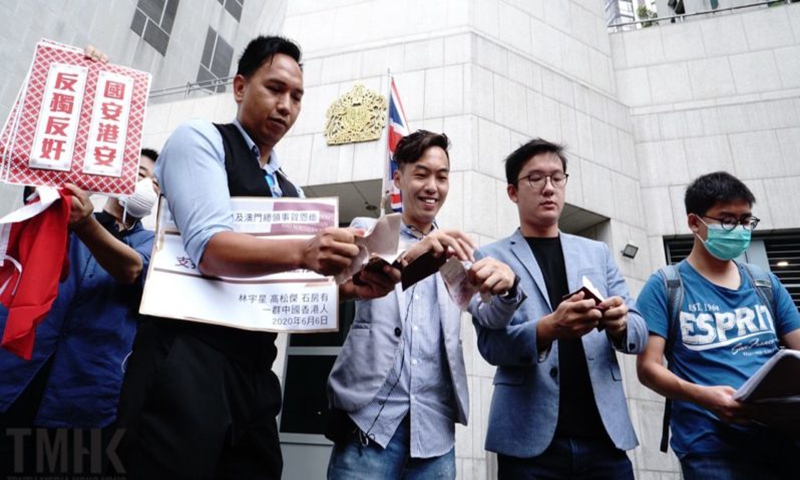HKers tear up BNO passports in front of consulate to protest against UK interference over national security law
By Chen Qingqing Source:Global Times Published: 2020/6/7 19:48:58

Hong Kong residents tear up BNO passports in front of the consulate to protest against UK interference over the national security law. Photo: Courtesy of Ko Chung Kit Jacky
"Simply because I'm Chinese," Ko Chung Kit Jacky, a 41-year-old Hong Kong resident, who demonstrated at the British Consulate in Hong Kong on Saturday and tore up his British BNO passport on the spot, told the Global Times on Sunday when he was asked to explain why he made the gesture.Ko, along with other 12 local residents, held a peaceful demonstration in front of the British Consulate-General Hong Kong in Admiralty, Hong Kong Island, on Saturday, to express opposition to London's recent interference in Hong Kong affairs by promising new immigration rights to some Hong Kong residents. The move came as the UK put further pressure on China when the China's top legislature passed a decision to make the national security law for the Hong Kong Special Administrative Region (SAR) which could help end months-long riots and violence fuelled by secessionists, external forces and rising domestic terrorism.
"We strongly condemn the British government's blatant acts in interfering in China's internal affairs, and we are strongly dissatisfied," said Ko, the former holder of a BNO passport. Their offer only serves their political goals, which will only cause damage to the Hong Kong people's dignity as Chinese citizens, he noted.
The 13 demonstrators used to hold British National (Overseas) passports (BNO), and did not renew them when they expired, several of the demonstrators told the Global Times. "We oppose what the British Prime Minister recently said.
Some Hong Kong youngsters are living in a delusion because they were not born during those years under the British colonial rule, so how they would even know the true color of the UK government?" said one resident born in 1979.
"Under the British colonial rule, Hong Kong people did not have sufficient rights. The governor was appointed, officials were appointed… no one even dared to protest," he said, noting that those who were born before the return of the SAR to the motherland are indeed qualified to talk about this issue.
The UK is prepared to change its immigration rules if China imposes a national security law on Hong Kong, British Prime Minister Boris Johnson said on Wednesday in an op-ed for the South China Morning Post. Johnson added that China's decision to impose a national security law on Hong Kong will "curtail its freedoms and dramatically erode its autonomy."
"I held the BNO passport for ten years. I took part in this demonstration to protest against the UK for interfering in China's domestic affairs," Man Shek, another Hong Kong resident who tore up his BNO passport in front of the consulate, told the Global Times. "Not many people I know in Hong Kong are still holding valid BNO passports. The British official made such claims only out of political interests," he said.
Leung Chun-ying, the former top official of the HKSAR government, wrote on Facebook on Wednesday that Johnson's article in the South China Morning Post shows "parochial arrogance," and is again a manipulation of the BNO visa card.
Tian Feilong, a Hong Kong affairs expert and associate professor at Beihang University in Beijing, told the Global Times on Sunday that he would also suggest to authorities that if Hong Kong residents apply for UK passports through the BNO route, the Hong Kong SAR government should consider introducing legislature to revoke their Chinese nationality and permanent rights of abode in Hong Kong.
More Hong Kong residents have realized that holding a BNO passport is not equal to national treatment as UK citizens, as those who hold Hong Kong SAR passports are entitled to consular protection offered by the Chinese government while overseas, which would be much better, another demonstrator Eddie Lam said.
"We haven't even heard any anecdotes of local residents rushing to apply to renew their BNOs after the decision to introduce the national security law for Hong Kong was announced," Lam added.
As the Hong Kong SAR passports have become more popular, the numbers of BNO holders have largely declined in recent years, according to media reports.
In 2006, the number of BNOs issued dropped to 30,000 and then to 7,600 in 2011. The number of BNO holders dropped from 800,000 in 2007 to 140,000 in 2015, the reports showed.
When asked to comment on a recent survey stating about 37 percent of Hong Kong residents are considering moving overseas, Zhao Lijian, spokesperson of the Chinese Foreign Ministry, told a press conference on Thursday that they are free to come to and leave China. He also emphasized that political manipulation on the BNO issue or cross-border collusion in an attempt to interfere in China's internal affairs are both dead ends.